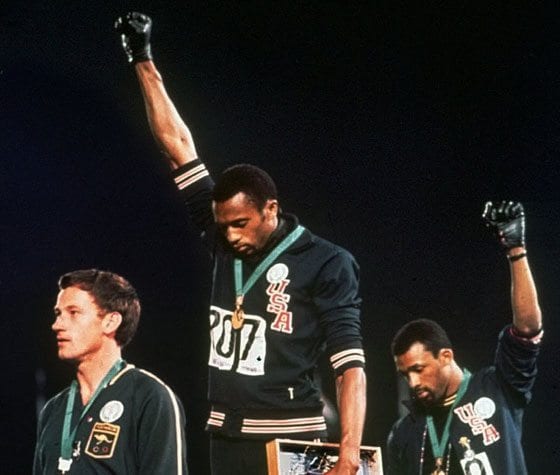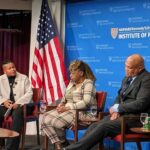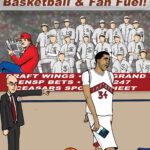
Tommie Smith looks to Obama and beyond
When he stood on the victory stand in Mexico City, his head bowed and his fist raised, Tommie Smith didn’t allow himself to think about racial progress in the United States, when a black man would be elected president or when Smith himself, once-reviled, would be honored on a holiday for Martin Luther King Jr.
“I didn’t think about what was possible, or what wasn’t,” Smith said last Monday, more than 40 years after he was exiled from the Olympics for raising a Black Power salute on the medal stand. “I didn’t think getting off the podium was possible for me at the time, with all the death threats I had received.”
Smith won the 200 meters in world-record time at the 1968 Olympics, then was expelled from the games along with bronze medalist John Carlos when they bowed their heads during the Star-Spangled Banner and raised their gloved fists in protest. They returned home to threats and found themselves ostracized.
Four decades later, Smith was in Boston to be honored during the Celtics’ game against the Phoenix Suns and to be inducted into the “True Heroes of Sport” Hall of Fame at the Northeastern Center for Sport and Society along with Carlos. On the eve of Barack Obama’s presidential inauguration, Smith saw his protest as part of a movement that isn’t quite finished.
“It means somebody heard my steps — besides people in the races I ran against,” Smith said. “It’s a great stride forward, just because we have a person with hue, and with an African American background. That doesn’t mean our job is over; it means it’s just begun. I don’t mean people of color, I mean everybody in the nation.”
Smith met with the team captains before the game, then raised his eyes to look at the U.S. flag on the video screen during the national anthem. Carlos could not make the game because of a speaking engagement, but his wife, Charlene, was recognized in his absence.
“I’m not a big believer that just because you play good golf or good basketball doesn’t mean you have to be the spokesman for the race,” Celtics coach Doc Rivers said. “[But] I like people like that, who have given something else to the sport. They were blackballed from life. They didn’t get jobs. That was as big a sacrifice as you could make.”
The Celtics, who played in Miami last Wednesday, took a team vote to fly out early the day before so they could arrive in time to see the inauguration on TV, even though Rivers had offered to tape it for them. (Guard Ray Allen had tickets and was in Washington, D.C., for the ceremony.)
“They said, ‘No, we want to see it live. We think it’s that important,’” Rivers said. “One of them said, ‘Twenty or 30 years from now, I want to say I saw him speak live when he came in.’ I guess it will be like JFK in a lot of ways. I’m glad our guys have the awareness of real life.”
Meeting Smith was, for some of the players, a similar thrill.
“For him to tell his story now, and to show the progress as a people on a whole that we’ve made in our society — I was just inspired with him just being in the room,” Celtics forward Kevin Garnett said. “The state of the world, and where it was, and what they did — it was monumental. And I think it will always be monumental. It was a very key moment in sports and in life.”
When Rivers invited Smith to the locker room after the game, he wondered how many of his 20-something players would recognize the 64-year-old Olympic champion. But rookie J.R. Giddens, who’s 23, went over to Smith before the game to introduce himself.
After asking his age, Smith gave a big smile.
“Whenever I run into guys like I will tonight, I will tell them that the game has just begun. Although yours ended, you have another, lifelong game. It’s called the future,” Smith said. “This is a new turn, and this turn can be remembered more than anybody in any race, especially me in the 200 meters.
“So we’ve got to keep on going,” he said. “The race is on.”
(Associated Press)






